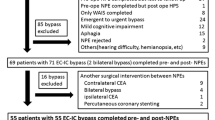Abstract
Clinical results as well as cognitive performances after extracranial to intracranial (EC-IC) bypass in conjunction with contralateral carotid endarterectomy (CEA) are poorly understood. Data from 14 patients who underwent unilateral EC-IC bypass for atherosclerotic internal carotid artery (ICA)/middle cerebral artery (MCA) steno-occlusive disease in conjunction with CEA for contralateral cervical carotid stenosis were retrospectively reviewed. Postoperative results were evaluated by MRI imagings. Nine patients also underwent neuropsychological examinations (NPEs), including assessment by the Wechsler Adult Intelligence Scale-Third Edition and the Wechsler Memory Scale-Revised (WMS-R) before and about 6 months after bilateral surgeries. Postoperative MRI follow-up (median, 8 months; interquartile range, 7–8 months) confirmed successful bypass in all patients, with no additional ischemic lesions on T2WI when compared with preoperative imaging. Further, MRA showed patent bypass and contralateral smooth patency at CEA portion in all patients. In the group rate analysis, all five postoperative NPE scores (Verbal IQ, Performance IQ, WMS-memory, WMS-attention, and Average scores of all those four scores) were improved relative to preoperative NPE scores. Performance IQ and Average score improvements were statistically significant. Clinical results after EC-IC bypass in conjunction with contralateral CEA were feasible. Based on the group rate analysis, we conclude that successful unilateral EC-IC bypass and contralateral carotid endarterectomy does not adversely affect postoperative cognitive function.




Similar content being viewed by others
Abbreviations
- CBF:
-
Cerebral blood flow
- CSDH:
-
Chronic subdural hematoma
- DSA:
-
Digital subtraction angiography
- DWI:
-
Diffusion-weighted imaging
- EC-IC:
-
Extracranial to intracranial
- ICA:
-
Internal carotid artery
- MCA:
-
Middle cerebral artery
- MPRAGE:
-
Magnetization-prepared rapid acquisition gradient echo
- MRA:
-
Magnetic resonance angiography
- NPE:
-
Neuropsychological examination
- OA:
-
Occipital artery
- PIQ:
-
Performance IQ
- SPECT:
-
Single-photon emission computed tomography
- SSEP:
-
Somatosensory evoked potentials
- STA:
-
Superficial temporal artery
- T2WI:
-
T2-weighted image
- VIQ:
-
Verbal IQ
- WAIS-III:
-
Wechsler Adult Intelligence Scale-Third Edition
- WMS-attention:
-
Attention/concentration score in WMS-R
- WMS-memory:
-
Composite memory score in WMS-R
- WMS-R:
-
Wechsler Memory Scale-Revised
References
Fukumitsu R, Yoshida K, Sadamasa N, Narumi O, Chin M, Yamagata S (2010) Strategy for revascularization of chronic carotid occlusion with contralateral carotid stenosis. No Shinkei Geka 38:139–146
Baracchini C, Meneghetti G, Manara R, Ermani M, Ballotta E (2006) Cerebral hemodynamics after contralateral carotid endarterectomy in patients with symptomatic and asymptomatic carotid occlusion: a 10-year follow up. J Cereb Blood Flow Metab 26:899–905
Rutgers DR, Klijn CJM, Ksppelle LJ, Eikelboom BC, van Huffelen AC, van der Grond J (2001) Sustained bilateral hemodynamic benefit of contralateral carotid endarterectomy inpatients with symptomatic internal carotid artery occlusion. Stroke 32:728–734
Fujita K, Maekawa H, Dairoku H, Yamanaka K (2006) [Japanese Wechsler Adult Intelligence Scale-Third eddition.] Tokyo:Nihon Bunka Kagakusha, (Jpn)
Sugishita M (2001) [Japanese Wechsler Memory Scale-Revised] Tokyo:Nihon Bunka Kagakusha, (Jpn)
Hishikawa T, Iihara K, Yamada N, Ishibashi-Ueda H, Miyamoto S (2010) Assessment of necrotic core with intraplaque hemorrhage in atherosclerotic carotid artery plaque by MR imaging with 3T gradient-echo sequence in patients with high-grade stenosis. J Neurosurg 113:890–896
North American Symptomatic Carotid Endarterectomy Trial Collaborators (1991) Beneficial effect of carotid endarterectomy in symptomatic patients with high-grade carotid stenosis. N Engl J Med 325:445–453
Furui T, Hasuo M (1984) Indwelling double-balloon shunt for carotid endarterectomy. Technical note J Neurosurg 60:861–863
Marshall RS, Festa JR, Cheung YK, Pavol MA, Derdeyn CP, Clarke WR, Videen TO, Grubb RL, Slane K, Powers WJ, Lazar RM (2014) Randomized evaluation of Carotid Occlusion and Neurocognition (RECON) trial. Main result Neurology 82:744–751
Dong Y, Teoh HL, Chan BP, Ning C, Yeo TT, Sinha AK, Venketasubramanian N, Slavin MJ, Sachdev P, Collinson SL, Chen C, Sharma VK (2012) Changes in cerebral hemodynamics and cognitive parameters after external carotid-internal carotid bypass surgery in patients with severe steno-occlusive diseases: a pilot study. J Neurol Sci 322:112–116
Fiedler J, Přbāň V, Škoda O, Schenk I, Schenková S, Poláková S (2011) Cognitive outcome after EC-IC bypass surgery in hemodynamic cerebral ischemia. Acta Neurochir 153:1303–1312
Sasoh M, Ogasawara K, Kuroda K, Okuguchi T, Terasaki K, Yamadate K, Ogawa A (2003) Effect of EC-IC bypass surgery on cognitive impairment in patients with hemodynamic cerebral ischemia. Surg Neurol 59:455–463
Inoue T, Ohwaki K, Tamura A, Tsutsumi K, Saito I, Saito N (2013) Subclinical ischemia verified by somatosensory evoked potential amplitude reduction during carotid endarterectomy: negative effect on cognitive performance. J Neurosurg 118:1023–1029
Ogasawara K, Yamadate K, Kobayashi M, Endo H, Fukuda T, Yoshida K, Terasaki K, Inoue T, Ogawa A (2005) Postoperative cerebral hyperperfusion associated with impaired cognitive function in patients undergoing carotid endarterectomy. J Neurosurg 102:38–44
Heyer EJ, Adams DC, Solomon RA, Todd GJ, Quest DO, McMahon DJ, Steneck SD, Choudhri TF, Connolly ES (1998) Neuropsychometric changes in patients after carotid endarterectomy. Stroke 29:1110–1115
Inoue T, Ohwaki K, Tamura A, Tsutsumi K, Saito I, Saito N (2014) Subtle structural change demonstrated on T2-weighted images after clipping of unruptured intracranial aneurysm: negative effect on cognitive performance. J Neurosurg 120:937–944
Otawara Y, Ogasawara K, Ogawa A, Yamadate K (2005) Cognitive function before and after surgery in patients with unruptured intracranial aneurysm. Stroke 36:142–143
Author information
Authors and Affiliations
Corresponding author
Ethics declarations
Disclosures
All authors certify that they have NO affiliations with or involvement in any organization or entity with any financial interest, or non-financial interest in the subject matter or materials discussed in this manuscript.
Rights and permissions
About this article
Cite this article
Inoue, T., Ohwaki, K., Tamura, A. et al. Extracranial-intracranial bypass for internal carotid/middle cerebral atherosclerotic steno-occlusive diseases in conjunction with carotid endarterectomy for contralateral cervical carotid stenosis: clinical results and cognitive performance. Neurosurg Rev 39, 633–641 (2016). https://doi.org/10.1007/s10143-016-0717-8
Received:
Revised:
Accepted:
Published:
Issue Date:
DOI: https://doi.org/10.1007/s10143-016-0717-8




